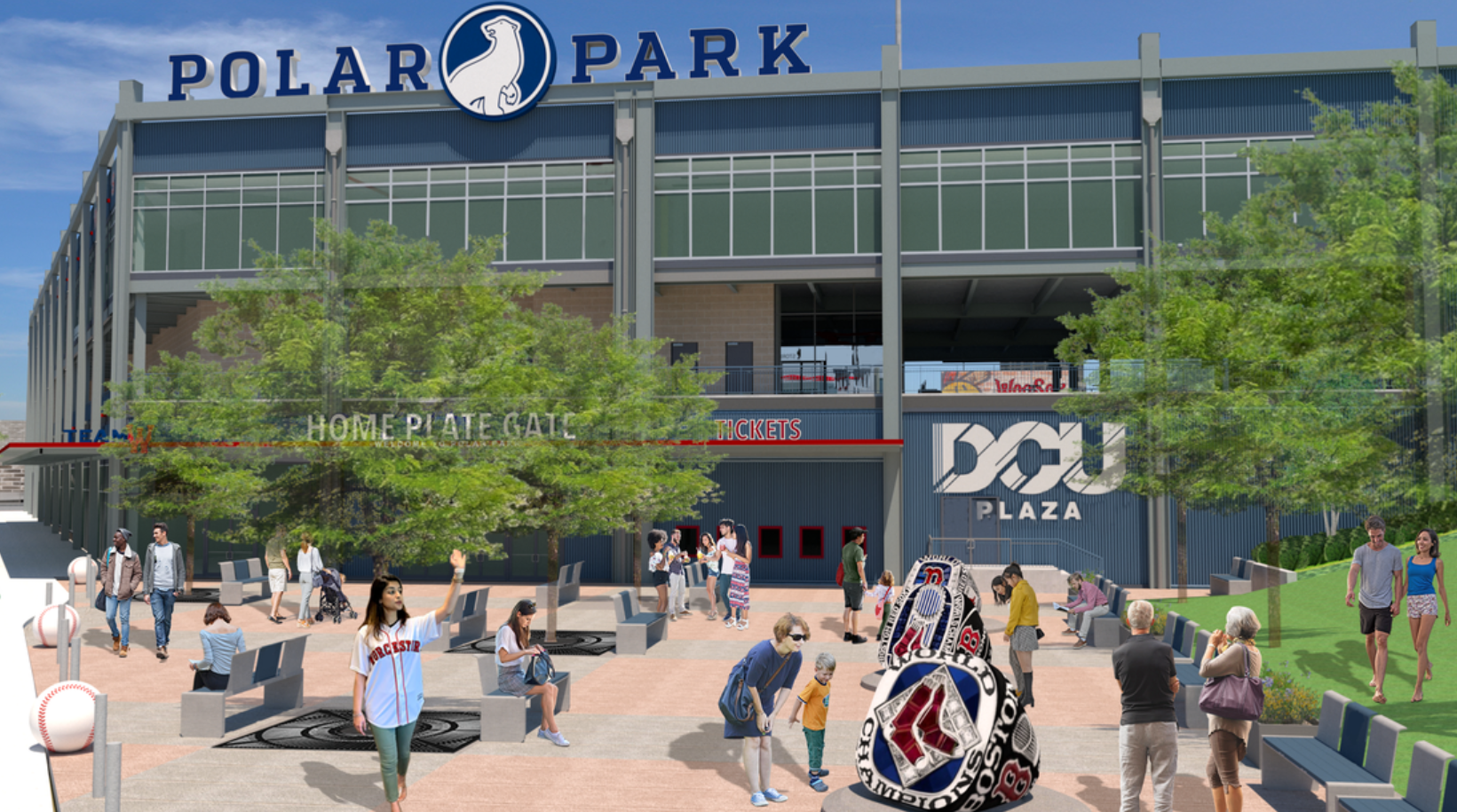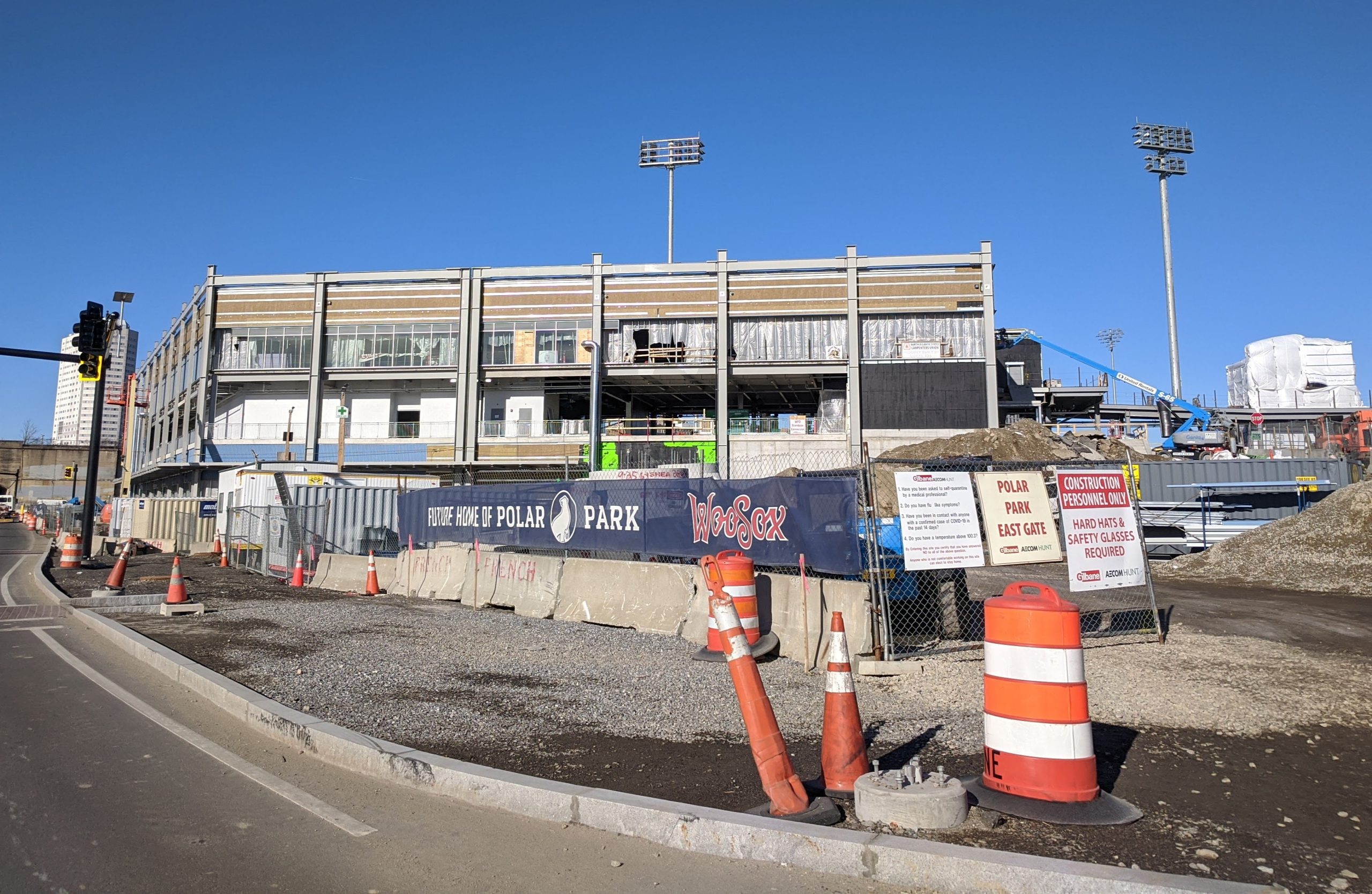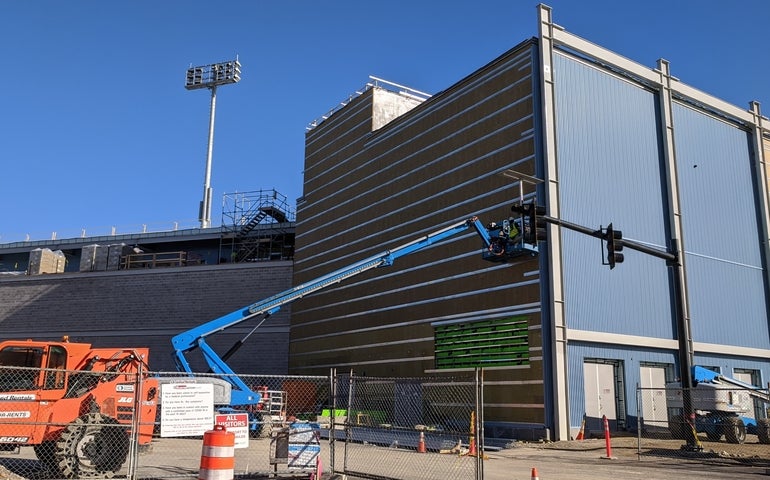The cost of building Polar Park, the new home of the minor league Worcester Red Sox, has risen to $157 million, Worcester officials said Friday afternoon, reflecting cost increases stemming largely from the coronavirus pandemic.
With the increase, the public facility will become the most expensive minor league baseball stadium ever built, surpassing the inflation adjusted $153-million home of the Las Vegas Aviators.
The WooSox have committed to covering the latest overruns, which the city says total $17.3 million, according to a memo to the Worcester City Council made public late Friday.
With potentially less than three months until the stadium’s opening, the city has also reached a tentative lease agreement with the baseball team, which now requires approval from the Worcester Redevelopment Authority. The City Council will also need to approve $14 million, including fees and interest, in new borrowing to cover most of the project’s latest overruns, which will then be repaid by the team. The team will pay $7.3 million of the overruns up front.
The proposed contract between the team and the city now comes with some changes from what was first described.
- The WooSox are slated to pay more than $1 million in annual rent for a 35-year term. That’s an extension from what had been a 30-year term.
- Among other proposed changes, the team now must wait 25 years if it wants to break the lease instead of an initial 15 years.
- An initial city guarantee for corporate sponsorship revenue has also been removed through 2025, pending WRA approval.
- The city’s potential penalty for not finishing the ballpark on time has also been reduced.
Friday’s financial update is the first for the project in nearly a year. In January 2020, city officials announced the project’s costs rose by about one-third, or more than $30 million.
In that case, roughly two-thirds of the increase came from unexpected costs borne by the city for obtaining adjacent parcels, moving businesses and knocking down buildings to make way for the ballpark. City officials didn’t know a business would need to move expensive communications equipment, driving much of those costs. The remainder came from construction costs for Polar Park itself.

Polar Park has now gained the title of the most expensive minor league ballpark ever built, even adjusting for inflation, according to Worcester Business Journal research. The most expensive is a $153-million stadium that opened in Las Vegas in 2019 with a larger capacity and more fixed seating than what is planned for Polar Park. TD Ameritrade Park, a college stadium in Omaha, Neb., and the largest ballpark by capacity outside Major League Baseball with space for 24,000 people, opened in 2011 at a cost of about $155 million in today’s dollars.
The 9,500-person-capacity Polar Park’s initial cost was $101 million, including construction costs of the stadium itself and related costs, such as obtaining and knocking down buildings that stood in the way.
Larry Lucchino, a principal owner of the WooSox, said in a statement late Friday that the team won’t compromise on elements of Polar Park because of the cost overruns.
“The partners in the WooSox ownership group remain committed — in our hearts and in our wallets — to creating a civic jewel of which the City of Worcester — and the Boston Red Sox — can be very proud,” he said in part.
“We knew this project would face unforeseeable circumstances; that is par for the course in our 30-year history of building ballparks,” Lucchino said. “What we did not know, of course, was that the toughest curveball would be the consequences of a worldwide pandemic. After our seven-week halt in construction last spring, we said, upon resumption, that, ‘We will save an assessment of the delay and the adverse impacts for another day.’ That day has come.”
The team, the top affiliate of the Boston Red Sox, also said it remains optimistic that the 2021 season can be held despite the pandemic. The 2020 season was canceled.
The WooSox will partially make up for their increased costs by raising fees per game ticket to $2 from $1.
The update on Polar Park’s costs comes nine months after city councilors filed formal requests to City Manager Edward Augustus inquiring about how the project was affected by the pandemic and whether the city would face any penalties for not having the work done on time. Augustus said in May that the pandemic would affect the project but for months the public hadn’t been updated on how the project was doing financially. The city administration said last fall councilors’ inquiries were answered privately.

“While 2020 has presented unbelievable challenges for this project and for our community at-large, we are looking ahead to 2021 with hope and optimism,” Augustus said in a memo to the City Council released Friday. “While we bid this project in a robust economy and then were hit by a global pandemic, including a significant work stoppage, the project is on track.”
There is nearly unanimity among sports economists that publicly financed stadiums are unwise decisions, and that municipalities are often at a major disadvantage with teams when it comes to negotiating financial terms. Augustus and other city officials have remained steadfast that the project will pay for itself with tax revenues from a special tax district on development surrounding the stadium, along with a few other revenue streams, such as parking fees.
Other critical pieces have belatedly fallen into place as the project has moved along.
In September, the Worcester Redevelopment Authority approved a land transfer for the Polar Park site to the city from Madison Properties, the developer whose planned office, retail, hotel and residential project next to the ballpark is being relied upon in large part to help the ballpark be economically feasible for the city. In the contract, the site is to be transferred to an unspecified third-party escrow agent.
Another agreement, an updated deal with Madison Properties to reflect project delays, was signed by the City Council in October. The agreement commits the city to five previously-approved tax breaks and the waiving of $2.25 million in permitting fees. Construction has yet to begin on the project, whose first phase was initially slated to open early this year.
City officials have been steadfast that Polar Park — and millions of dollars more in tax breaks, infrastructure improvements and other work — will pay for itself and then some through increased tax revenue, as well as revenue from parking and tickets. By the city’s estimates, Worcester will come out ahead by more than $20 million at the end of a 30-year bond payment for the ballpark.
In addition to the Madison Properties development, two other new projects are proposed next to the ballpark for which some new details were given Thursday. They carry a combined investment of nearly $100 million, according to the city.
One, from the Boston property investor Boston Capital, would be a largely residential project at the adjacent Table Talk Pies facility, with a $36-million first phase slated for construction as soon as next year. Another, from Worcester firm Churchill James, would include housing and a bowling alley on a Green Street site that includes the vacant Cove Music Hall. Project leaders for both projects cited the ballpark as an impetus for wanting to build in the neighborhood.
Table Talk plans to move its operations to a new facility underway on Gardner Street that’s due to open in June.

